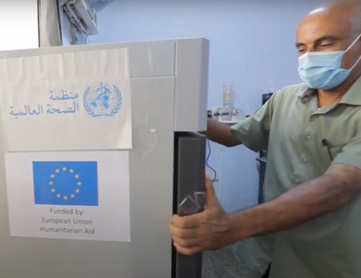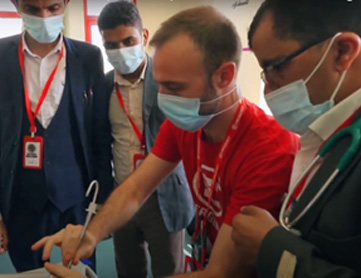Aden, Yemen 12 May 2022 – With support from the European Civil Protection and Humanitarian Aid Operations (ECHO), the World Health Organization (WHO) has supplied vital training, equipment and supplies that is allowing medical facilities to improve trauma, emergency and blood bank services for thousands of Yemeni citizens in conflict zones.
 Dr Edries with a new refrigerator for blood supplies“The armed conflict in Yemen has intensified the country’s deep need for emergency and trauma care, especially for people in conflict zones,” said Dr Adham Rashad Ismail, WHO Representative in Yemen. “In the past year, with ECHO’s support, we have trained paramedics and provided essential equipment to trauma teams and blood banks. These efforts have been life-saving in communities across Yemen.”
Dr Edries with a new refrigerator for blood supplies“The armed conflict in Yemen has intensified the country’s deep need for emergency and trauma care, especially for people in conflict zones,” said Dr Adham Rashad Ismail, WHO Representative in Yemen. “In the past year, with ECHO’s support, we have trained paramedics and provided essential equipment to trauma teams and blood banks. These efforts have been life-saving in communities across Yemen.”
Under the ECHO-funded WHO programme, a new trauma centre was built in Hajjah governorate to increase capacity to treat wounded or injured people. In collaboration with Yemen’s Ministry of Public Health and Population, WHO also trained 113 front-line health care workers in pre-hospital management of trauma patients. The training, aimed at increasing treatment capacity in high-risk areas, targeted health care workers in the conflict regions of Ibb, Taiz, Albayda, Hajjah, Hodeidah, Amran and Sa’dah governorates.
With ECHO funds, WHO has provided technical support to trauma teams who performed more than 7400 surgeries in hospitals in Hodeidah, Ibb and Aden governorates in 2021. In Hodeidah and Aden, WHO also provided blood banks with new refrigerators, centrifuges and other key supplies and equipment.
Ahmed Edries, Director of Al Jumuhuria hospital laboratories in Aden, said his facility, which has 300 to 400 blood donors a month, was in dire need of more space for blood storage. The new equipment provided by WHO has allowed for increased capacity.
 Paramedics receiving training under the ECHO-funded WHO programme.“The refrigerators we were using were old and worn out,” he said. “We also received a new frozen plasma refrigerator, which is needed for burn-related injuries. This support has meant a great deal to our hospital.”
Paramedics receiving training under the ECHO-funded WHO programme.“The refrigerators we were using were old and worn out,” he said. “We also received a new frozen plasma refrigerator, which is needed for burn-related injuries. This support has meant a great deal to our hospital.”
Mohammed Abdulwadood, a paramedic in Sa’dah governorate, said the training he and other paramedics received from WHO last year was “extremely beneficial,” especially because “we were lacking information in some areas.”
“We learned to use the Ambu bag (manual resuscitator) to stabilize patients,” he said. “We learned first aid procedures for accidents and injuries in the context of conflict and emergencies. The training provided us with practical as well as theoretical knowledge.”
In the past seven years, war and economic crisis have deepened Yemen’s humanitarian needs and devastated its health care infrastructure and services.
The majority of Yemen’s 30 million people lack basic necessities and services. More than 20 million have inadequate or no access to health care, while over 15 million Yemenis lack access to safe drinking water and sanitation, and about 16.2 million are food insecure.
Around 4 million Yemenis are internally displaced persons (IDPs), living in even worse conditions. Meanwhile, only about half of the country’s health facilities are fully operational due to the conflict and economic decline.
“ECHO is supporting our assistance to emergency and trauma services in Yemen because the need for them is so extreme,” said Dr Adham. “ECHO is providing WHO with vital financial aid as we do everything in our power to relieve the immense suffering in Yemen.”




